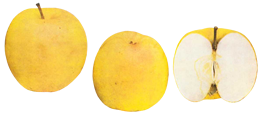The Apple Growers’ Blues
A spring freeze that wiped out 88 per cent of Ontario’s apple crop is only the latest in a string of challenges pressuring local growers to squeeze more value out of the humble apple.
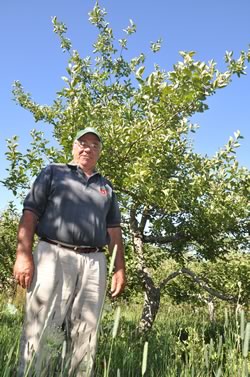
After 2011’s bumper crop, Bob Giffen laments the loss of more than 90 per cent of this year’s yield. Photo by Trina Berlo.
The early spring thaw and April frost hit hardest in Glen Huron, where Bob Giffen, 68, runs a hundred-acre apple orchard and Giffen’s Country Market. Giffen estimates 97 per cent of his crop was wiped out by the refreeze. It’s the worst crop failure he’s seen in 45 years. Giffen has crop insurance, but that won’t cover the costs of leaving his cold storage facilities empty, his fleet of trucks idle – or the salaries of the 20 employees he would usually hire.
Even in a normal year, Giffen would have plenty to say about his declining fortunes. Ontarians consume more fresh fruit every year, but less and less of it comes from here. We import nearly half our fresh apples. While apple imports from places like China are increasing, Ontario exports are in decline. Apple acreage in the province is less than half what it was in 1994.
It’s a squeeze forcing local farmers like Giffen to modernize, make more farmgate sales directly to consumers, process their own product to add value, or simply pull out of the business altogether. The situation is partly our fault. Given an array of imported choices, we’re all too likely to pick the Granny Smith from Washington over the McIntosh from down the road. The mainstay varieties that grow best here, like the Mac, aren’t the big sellers they used to be. The other problems are grocery store consolidation and fierce competition in which the major food retailers wield all the power and farmers get squeezed.
“The cost of production has gone up very dramatically in the last decade, and yet the return to the farmer has not,” says Brian Gilroy, chairman of the Ontario Apple Growers. If apples sell for a dollar a pound at the grocery store, the farmer would be lucky to get a quarter.
“We grow it, take all the risk, but the packer gets as much as we do, and the retailer gets twice as much. If you can capture the rest of the 75 cents a pound by retailing it yourself, that’s where your money seems to be in apple growing,” says Gilroy.
The proof is in Giffen’s small produce and baked goods shop nestled amidst the orchards and storage buildings on Station Street in Glen Huron.
“I’d survive a lot better on ten acres of apples and sell all our own just out of the store,” says Giffen, but for now he’s trapped by the inertia of his investments in cold storage and trucking.
The future appears to be in large scale, corporate farms or small pick-your-own operations and farm stores, with medium-sized family farms like Giffen’s gradually disappearing. To grow and be more profitable, he says, farmers have to invest in planting dwarf trees in high density – a thousand or more to an acre instead of his 200. At $20,000 an acre to plant, high density is capital intensive, but the payoff is increased yield and lower labour costs.
Still, few are willing to put up the money. “There’s not many 25 or 30 year olds in this business,” says Giffen. At 68, he has opted to downsize. He recently received a subsidy to rip out 30 acres of trees. From 2008 to 2010, the Canada-Ontario Orchards and Vineyards Transition Program (OVTP) offered farmers $1,600 per acre to destroy orchards.
The intent was to get rid of “inefficient” trees, says Giffen. “But man, some of those acres we pushed out were not inefficient.”
While other apple producing provinces (B.C., Quebec and Nova Scotia) have funding programs to pay for replanting with modern orchards, for years the Ontario Apple Growers have been unsuccessfully lobbying the province for similar support. The OVTP came with no incentive or requirement to replant.
“Growers just took the money and ran,” says Giffen.
Giffen’s Country Market
55 Station St, Glen Huron
705-466-3080
A soft spot for hard cider
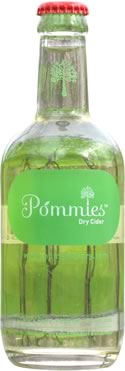 A Caledon East couple is turning Ontario apples into profits at their recently opened Bolton processing and bottling plant. Nick Sutcliffe and Lindsay Smith’s Pommies Dry Cider has made it onto the coveted shelves of the Liquor Control Board of Ontario.
A Caledon East couple is turning Ontario apples into profits at their recently opened Bolton processing and bottling plant. Nick Sutcliffe and Lindsay Smith’s Pommies Dry Cider has made it onto the coveted shelves of the Liquor Control Board of Ontario.
The timing was right for the couple thanks to a spike in the worldwide popularity of hard cider as a beer alternative in the wake of Prince William’s endorsement of the beverage in the UK. In the last three years, the LCBO has seen a 34 per cent increase in its volume of cider sales, 19.7 per cent last year alone.
“We think we can make a mark in Caledon for cider,” says Smith. “We should. We have lots of apples here.”
Smith and Sutcliffe buy only Ontario apples for their cider (although this year’s crop failure may force them to look further afield). The apples are pressed at Spirit Tree Estate Cidery and transferred to the Pommies facility on Healey Road in Bolton for the fermentation process and bottling.
Eventually, the couple hopes to acquire their own orchard and open a retail store selling their cider directly to the public. Sutcliffe says it’s the taste that sets Pommies apart from other ciders. “Ontario grows great cider apples with high acidity because of the cold climate.” Their secret recipe uses a minimum of three to five apple varieties, no concentrates – ever.
“What you put in you get out,” says Sutcliffe. “You can taste the freshness.”
Weather matters at the pick-your-own
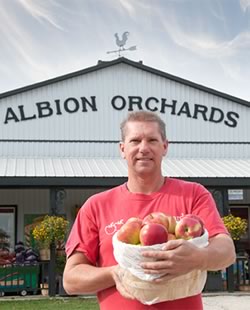
With a spring frost and a summer drought, “This is the worst year I’ve ever had,” says Albion Orchards’ Scott Lunau. Photo by Pete Paterson.
With a small operation on 50 acres where he grows apples for direct sale from his own store, Scott Lunau is avoiding the wholesale market entirely. Lunau bought his farm 16 years ago. Early on, he realized there was no money in wholesaling apples. So he opened Albion Orchards Apple Farm and Country Market, a pick-your-own business and on-farm store. His success is tied to his proximity to the GTA. He can sell fresh-from-the-farm apples at lower than grocery store prices and still make a profit. Last year, Lunau sold fresh apples for 89 cents a pound. Some of his best customers are older European immigrants.
“They recognize that if you go to the farm at harvest time, you can buy lots and save money.” A local-eating tradition that predates the notion of a hundred-mile anything. “But most Canadian young people don’t really think that way,” he says. “They’re not coming to the farm to stock up and save money. They’re just coming here strictly for entertainment.”
Which makes the pick-your-own biz as weather dependent for the selling season as it is for growing. Lunau’s business is open only from mid-August to December. “We count on nice sunny Sunday afternoons. If it’s rainy, we’re dead.” This year, however, he is praying for rain.
Lunau wasn’t hit as hard by the spring frost this year as Giffen, but he still suffered “well over 50 per cent” crop loss on his 6,000 trees. And with the dry conditions this summer, his losses now stand at close to 90 per cent. Province-wide, crop loss prior to the drought was estimated at 88 per cent.
“I will not have enough apples to sell to get by,” says Lunau, who struggles to find enough time to farm as a single father of two young children. “This is the worst year I’ve ever had. Things are going downhill really quickly.
“I’ve got to find other things to sell,” he concludes. “I learned quickly you can’t just have a store and sell apples. We sell some cookies and pies, juice, a lot of apple cider.” He grows pumpkins and Christmas trees too, and is looking for other ways to branch out.
Albion Orchards
14800 Innis Lake Rd, Caledon
905-584-0354
High spirits at the Cidery
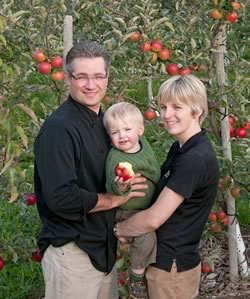
Tom Wilson and Nicole Judge of Spirit Tree Estate Cidery expect to be the only orchard in Ontario that will harvest more this year than last. Photo by Pete Paterson.
Scott Lunau might look no further than the other side of Highway 10 in Caledon to find a way to add more value to the apple business. Tom Wilson grew up on a pick-your-own farm like Lunau’s, but in 2007 he and his veterinarian wife Nicole Judge ventured in a new direction.
“We wanted to do something that wasn’t as affected by weather, and something more upscale,” says Judge.
The pair bought a property on Boston Mills Road, planted a new high-density orchard, and built an innovative, geothermally heated and cooled timberframe and strawbale building to house a cider press, fermentation room, wood-fired oven bakery, retail store and tasting room for their new year-round business – Spirit Tree Estate Cidery.
They went to Somerset, England, and then Cornell University to take courses from the world’s foremost cider-making expert. They took pastry, bread making, and wood oven courses to round out their skill set for a food philosophy that is back to basics, from scratch and local. Spirit Tree’s bread is made from locally stone-ground, Hockley Valley–grown heritage Red Fife wheat. On Friday evenings, the wood oven is reserved for thin crust pizza. Commuters and cottagers can call ahead for pick up, stay to eat on the deck, or take away some cider for the weekend with their order.
Today, Spirit Tree’s fledgling orchards are increasing production by about 80 per cent each year. This spring’s frost damage was only about 20 per cent, making them perhaps the only orchard in Ontario that will harvest more this year than last. The market for hard cider as a beer alternative is booming, following in the tracks of the microbrewery trend. And Wilson has noticed a spike in demand for juice apples for the first time in decades. Even large brewers like Alexander Keith’s are launching ciders, but Spirit Tree is ahead of the curve with a product that is truly artisanal and local.
Even as subdivisions close in on the farms and orchards around Spirit Tree, it only means their customer base will grow. And they no longer dread the autumn rains, which now drive customers into their place to have a snack and drink by the fire. Wilson and Judge are in the right place at the right time, and they seem to represent the future of the local apple, whose value nowadays lies more in what you can add to it – by baking it into pies, opening the farm to tourism, or pressing and fermenting it into cider – than the humble fruit itself.
Spirit Tree Estate Cidery
1137 Boston Mills Rd, Caledon
905-838-2530




